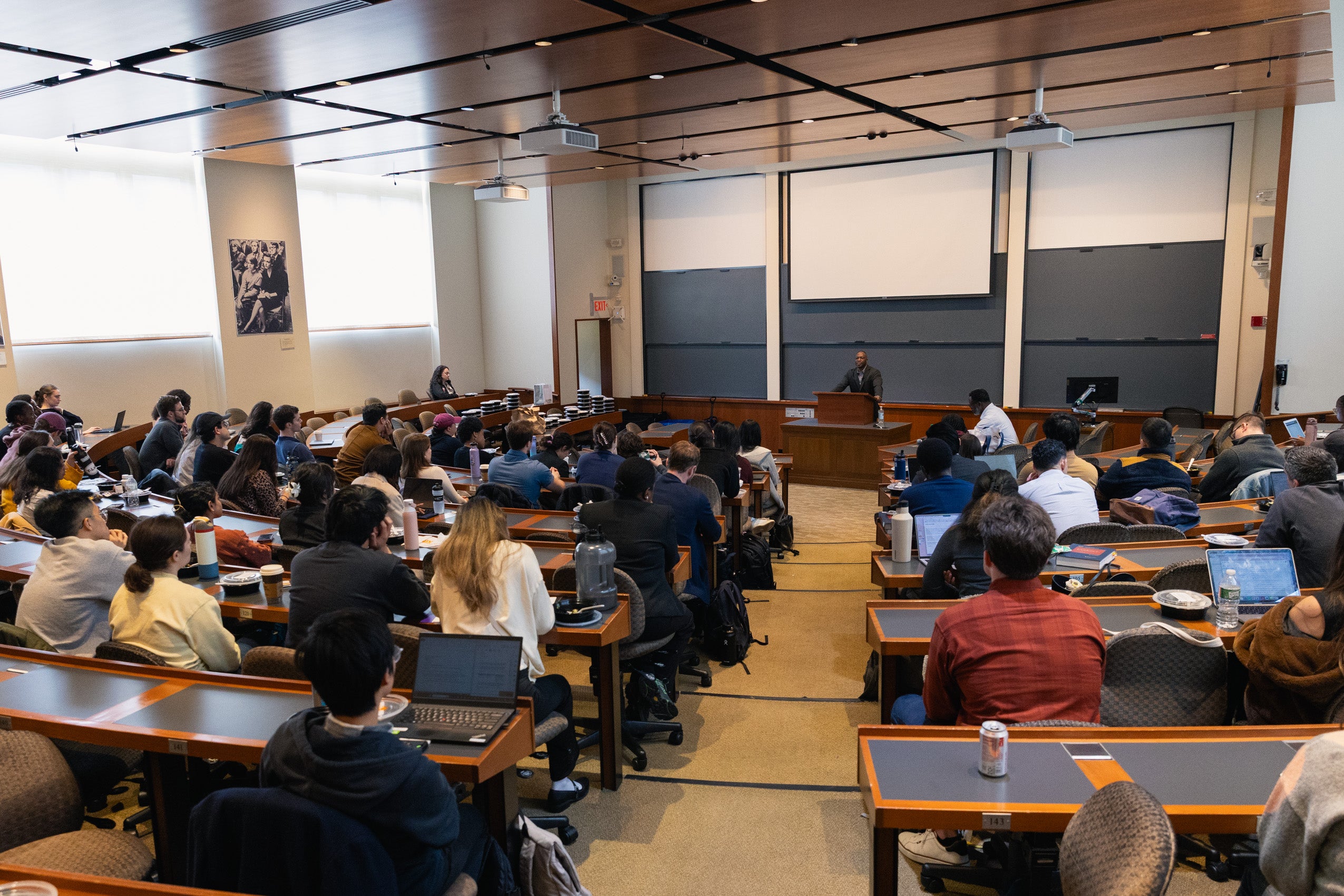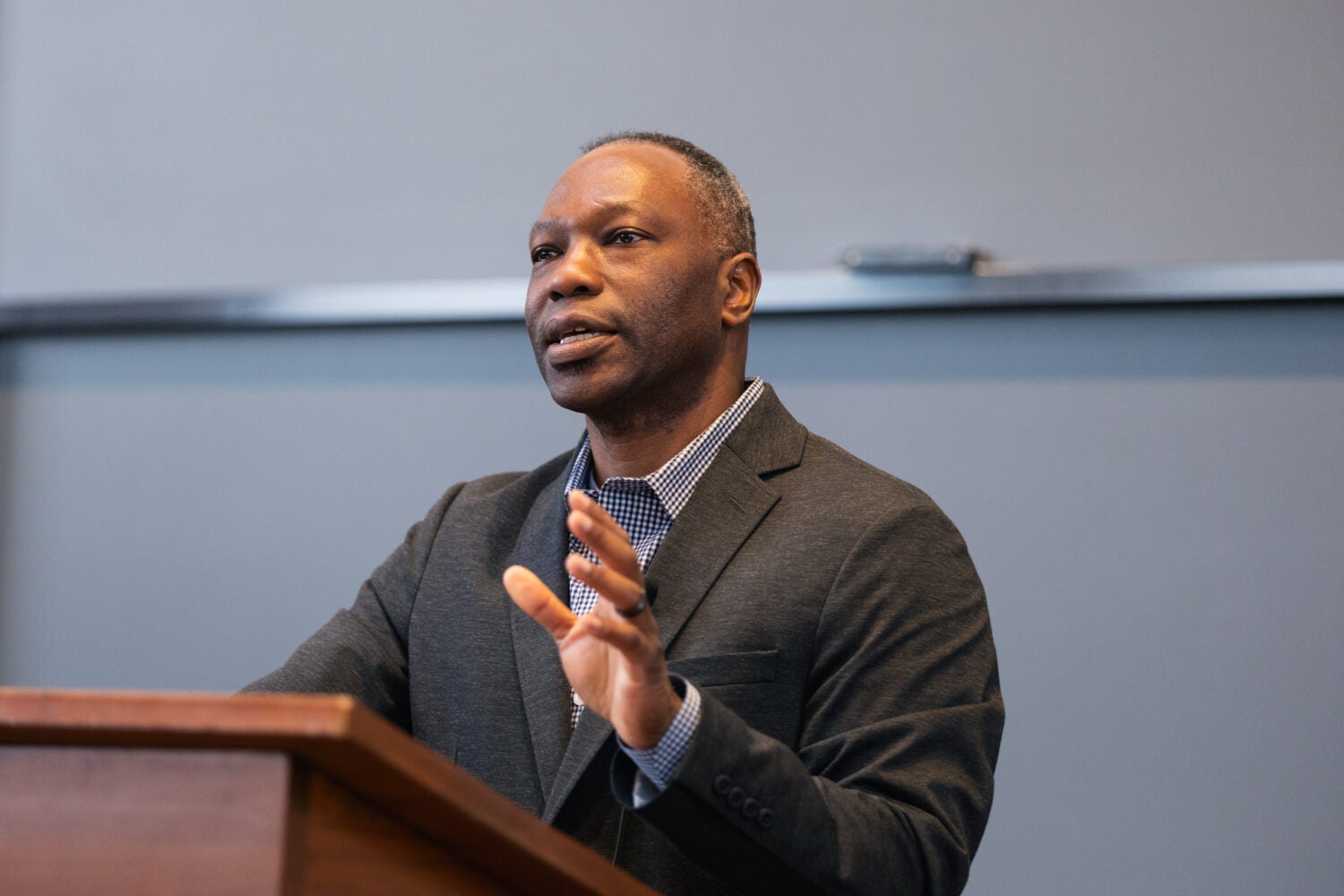Harvard Law School Professor Guy-Uriel Charles is the child of Haitian immigrants who left their country of birth because its institutions of governance failed them. In part because of their experience, when it came time for Charles to choose a career, he chose the law so he could understand why some institutions work and others do not.
“I’m an institutionalist,” he told members of Harvard Law School’s Class of 2025 in remarks delivered on March 31. “I care about institutions. I care about them working, and I care about them working for every part of a society because I grew up with the costs of a group of people for whom they didn’t work.”
Charles, the Charles Ogletree Jr. Professor of Law and faculty director of the Charles Hamilton Houston Institute for Race & Justice, was speaking as part of the Last Lecture series, in which faculty members chosen by the graduating students’ class marshals deliver parting words of wisdom.
A leading authority on election law and other fields, Charles writes academic and popular articles on race, the electoral process, and how the law mediates political power. But in his Last Lecture he didn’t confine his remarks to his professional work; instead, he talked mostly about his life experiences and how they have influenced the way he thinks about the current political moment in the United States.

No country’s institutions are perfect, Charles told the students, but he has spent his own career trying to discover how to make them better.
“The commitment to inclusiveness, from my perspective, is core and fundamental and a necessary part of the constitutional order,” he said. “It helps us to provide a framework for the promotion of human flourishing and individual liberty.”
Charles acknowledged at the outset of his lecture that while some students may be worried about the changes taking place in this country, others may welcome them. He promised to address them all.
“I take my task this afternoon to address the full range of views,” he said, “to be able to speak to those who seem to think this is a marked departure from fundamental commitments and are fearful, and to those who think this is a marked departure from fundamental commitments and are hopeful.”
‘The wheel does turn’
Charles said he has been reflecting recently on a favorite quote from actor Mandy Patinkin who has said, in interviews about his work with refugees, that “the wheel is always turning.”
Charles pointed to his own experiences of racism as a Black man: He said he has frequently been the target of racial slurs. He was once stopped at gunpoint by police on the way back from a law firm gathering. He and his friends used to, only half-jokingly, tell each other to call the NAACP if they weren’t back by a certain time.
Still, he said, his experiences pale in comparison to those of Louise Lassiter, a Black woman who unsuccessfully challenged North Carolina’s voter literacy test requirement. The U.S. Supreme Court ruled against her in 1959; the test wouldn’t be thrown out until passage of the 1965 Voting Rights Act.
But it was eventually thrown out.
“The wheel does turn,” Charles said. “Eventually justice catches up.”
Charles said he appreciates Patinkin’s quote in another way too. Because as the wheel turns, sometimes people on the bottom of it make their way to the top. And when that sort of restructuring takes place, it matters how people and communities have treated each other in the past.
In favor of inclusive institutions
“The lesson that I take is the importance of being committed to creating and supporting the liberal American — and [by] liberal here, I don’t mean political liberal [but] theoretical liberalism — the liberal American constitutional republic that is as inclusive as possible,” he said. “Part of how I understand my career … is trying to understand or create or support a framework where people with existential differences, or people who find themselves in a different part of the wheel, can build community with one another.”
Charles voiced his concern that Americans are retreating into their “separate identities.”
“It is important and necessary to recognize each other’s humanity, especially and particularly when we disagree with one another.”
“My worry is that, that is inconsistent not just with building an inclusive political order —but that it cannot last,” he said. “We will either learn to live together and figure out how to do so or we will die apart. It is important and necessary to recognize each other’s humanity, especially and particularly when we disagree with one another.”
Charles described his childhood in Stamford, Connecticut, a “community of difference” where people of various ethnic and racial backgrounds lived in proximity.
“To be able to hold onto difference while at the same time figuring out and building solidarity and commonality — it wasn’t easy, but it is a lesson that I learned,” he said. “Part of what it means to build a constitutional framework is to build bridges across difference, is to build relationships outside of our basic groups, is to recognize one another’s humanity.”
‘Joy comes in the morning’
Charles told the students he didn’t have ready answers for them about how to do that work.
“I don’t have any prescriptions for you, I don’t have any solutions, and, if I purported to have them, you shouldn’t believe them,” he said.
But he did offer a lesson from Black culture, and in particular the Black church (where Charles’ father was, in addition to being a factory worker and custodian, a pastor):
“Weeping may endure for a night, but joy comes in the morning,” Charles said, quoting from the Bible’s Book of Psalms.
Pain — including the pain some people are experiencing in this particular political climate — is unavoidable, he said.
“Structural inequality is real, and the type of things that pit us against one another are also real,” he said.
Unlike pain, he went on, joy is not “inevitable;” instead, it takes work and comes from shared experiences.
Harvard Law graduates are prepared for just that kind of work, he added.
“One of the things I’ve learned from you all and this community is that you are insistent on bringing joy,” Charles said. “Weeping will come; joy is a function of your insistence. Joy is a function of your solidarity. Joy is a function of how well you want to see and appreciate that, even though this is not your reality, that you can put yourself in the place of somebody else and try to understand their reality, find commonality, and build a framework that works for all.”

View full coverage from the festivities of the 2025 Class Day and Commencement Ceremonies at Harvard Law School
Want to stay up to date with Harvard Law Today? Sign up for our weekly newsletter.
